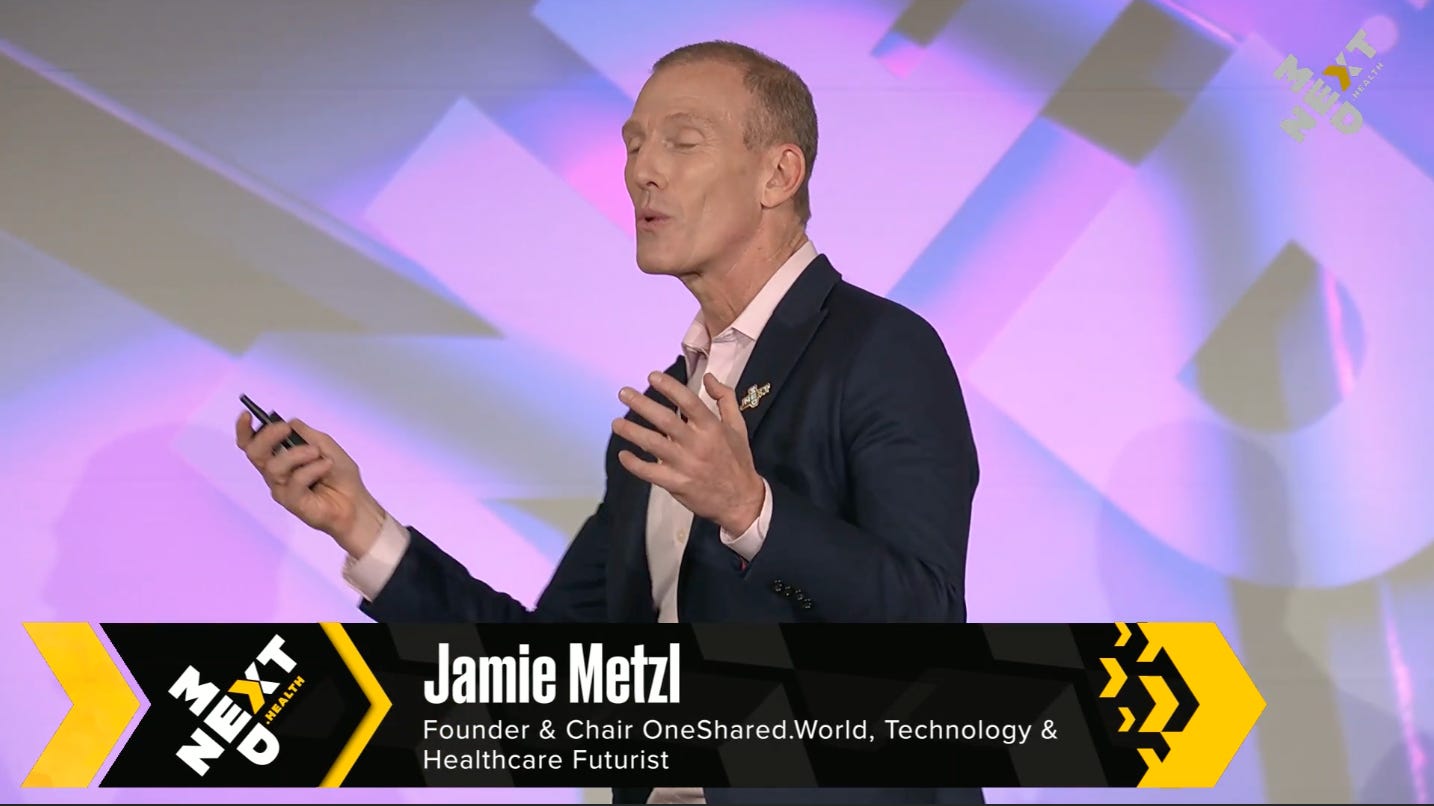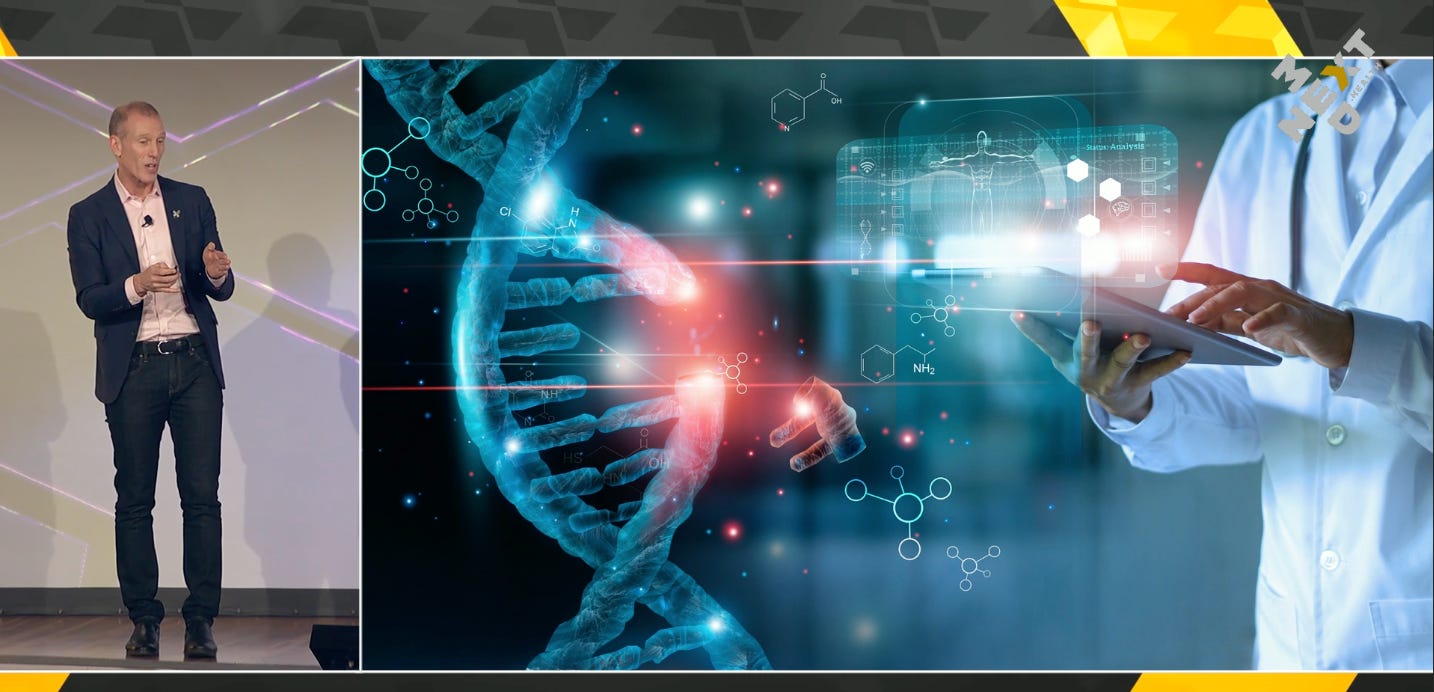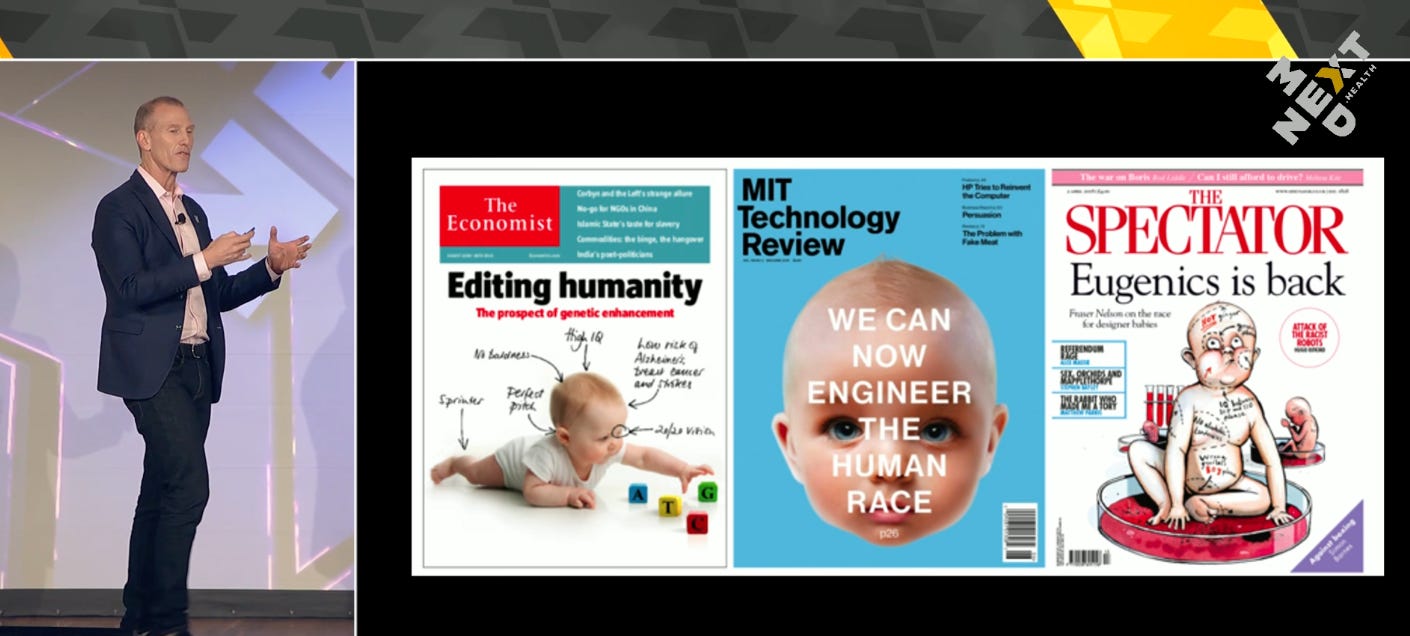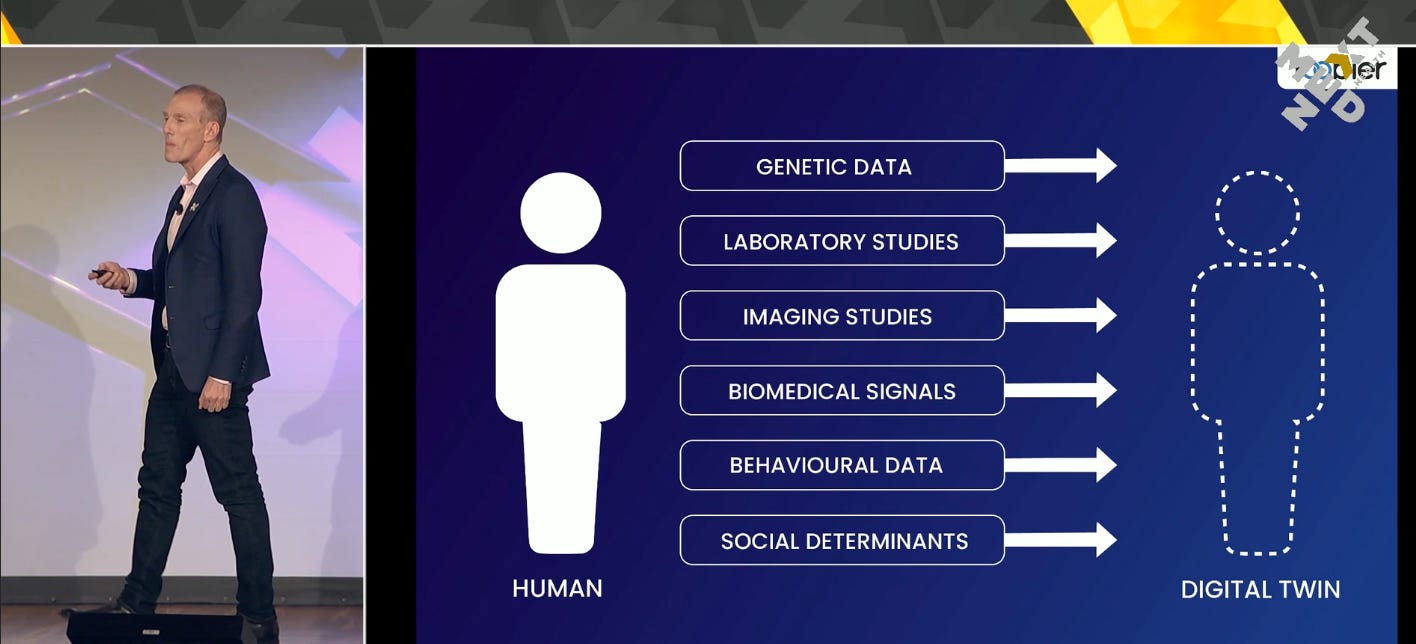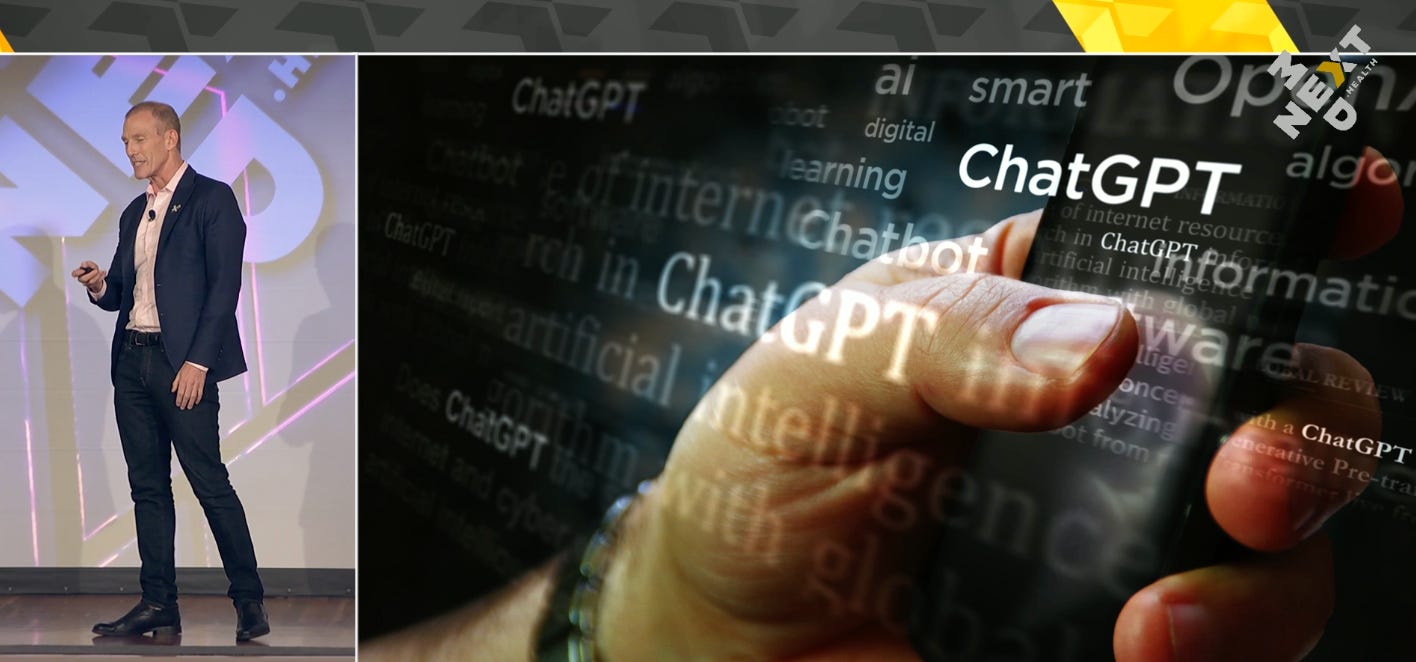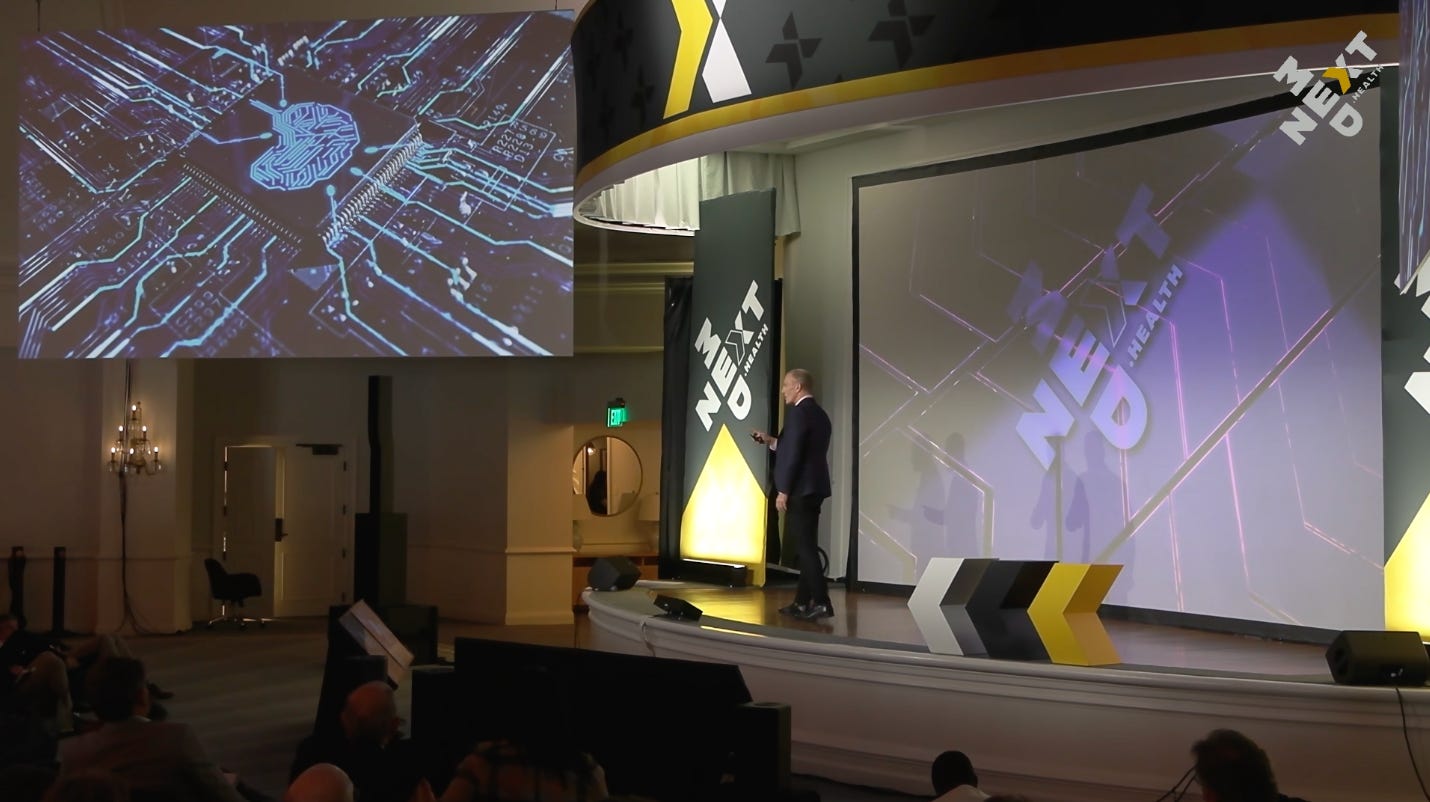Jamie Metzl on the Future of Healthcare: Superconvergence and the Human Imagination
From the Stars to the Clinic: Why Perspective Matters
Jamie Metzl, futurist, author, and polymath, opened his speech at NextMed Health with a simple yet profound framing device: zooming out to the Milky Way Galaxy before bringing the conversation all the way back to the patient bedside. To understand the future of healthcare, Metzl argues, we must first understand our place in a broader story—one not only of science and technology but of unleashed human imagination. This idea sets the tone for his talk: that innovation in healthcare is not only technical but fundamentally human.
The Real Meaning of Convergence
Metzl’s central thesis centers on what he calls superconvergence—the merging of fields such as genetics, AI, biotechnology, and data science, now accelerated by exponential technologies. He likens this convergence to a funnel: big ideas, like genomic data and AI breakthroughs, must ultimately be translated into real-world applications that impact human lives. The future of health is not only about decoding genes or building smarter algorithms, but also about integrating workflows, rethinking incentives, and aligning technological progress with human values.
A Personal Story: The Power of Precision Medicine
To ground these big themes in reality, Metzl shared the moving story of his father, a pediatrician diagnosed with Stage 4 metastatic neuroendocrine cancer. Rather than follow a traditional chemotherapy protocol, Metzl worked with a network of experts—including Cancer Commons and his physician friend Dr. Daniel Kraft—to have his father’s tumor genome sequenced and grown into organoids for tailored testing. This precision-first approach revealed a rare BRAF mutation typically seen in other cancer types. Leveraging this insight, they opted for a targeted therapy, diverging from standard treatment and dramatically extending his father's life and quality of living.
This approach exemplifies the future Metzl envisions: one where patients are treated as if it’s 10 years into the future, not the past. The case was so impactful that it became the subject of a medical journal publication, potentially informing treatment for others with similar rare mutations. It’s a vivid example of how an “n of 1” story can scale to many through data-sharing, precision care, and genomic insight.
The Coming Age of Human + AI Collaboration
Metzl compares AI today to electricity a century ago. Just as electricity became embedded in nearly every aspect of modern life, AI is poised to do the same—not as a standalone marvel, but as a general-purpose enabler. From ChatGPT to multimodal agentic systems that can see, hear, and interact with the world, we are entering what Metzl calls the “Mr. Potato Head phase” of AI—where we begin attaching real-world capabilities like sensors and mobility to digital agents. This will profoundly impact how care is delivered and decisions are made.
However, he stresses that success won’t look like a magic button that delivers miracles. Instead, it will look like machines liberating humans to do what we do best: empathize, imagine, connect, and create. AI should amplify, not replace, our humanity.
From Population-Based to Precision-Based Healthcare
Healthcare today is largely reactive and based on population averages. Metzl envisions a shift toward individualized care, driven by genomics, digital twins, and continuously updated biological models. As we gather more high-quality data, he says, we’ll see a compounding effect: better models, stronger algorithms, and deeper insight into complex biological systems. This will usher in a new era of precision medicine where treatment is informed by each person’s unique biology, not generalized protocols.
Unlocking the Power of Biological Modeling
Metzl highlighted breakthrough efforts like DeepMind’s AlphaFold, which predicted the structures of over 200 million known proteins. This leap, powered by AI, signals more than a solution to one scientific challenge—it hints at how many similarly complex problems can be solved in the future. Projects like the AI virtual cell, led by Steve Quake and others, aim to create digital replicas of living cells. Though a multi-decade effort, such models would transform how we understand disease, drug response, and development from the inside out.
Digital Twinning and Xenotransplantation
Other innovations are rapidly unfolding: the creation of digital twins for patients (precise simulations based on health data), and xenotransplantation (transplanting genetically engineered pig organs into humans), which recently expanded from hearts and kidneys to include livers. These are not science fiction—they’re happening now, and they represent an entirely new modality of treatment for previously untreatable conditions.
The Challenge: Keeping Clinicians Ahead of the Curve
Despite the explosion of progress, Metzl identifies a key problem: local doctors can’t always keep up. Oncology in particular is evolving so rapidly that standard treatment protocols are often outdated. His forthcoming article for AARP magazine aims to help newly diagnosed patients and their families make informed decisions in those first critical weeks—when they know the least, but need to act the most decisively. In a world where therapeutic options multiply daily, empowering both doctors and patients with real-time insight becomes mission-critical.
Cautionary Tales and Responsible Innovation
Metzl acknowledges the risks of moving too fast. He recalls the tragic 1999 gene therapy trial at the University of Pennsylvania, where a patient death stalled progress in the field for years. The future of CRISPR and human genome editing, he says, will require careful oversight and collective wisdom. As a member of the WHO advisory committee on human genome editing, Metzl has seen both the promise and peril of these tools firsthand. Used wisely, they could prevent countless deadly genetic disorders. Used recklessly, they could trigger a backlash that halts lifesaving advances.
The Paradox of Technology: Cure and Catastrophe
Metzl illustrates the dual nature of technology with COVID-19: the same advances in synthetic biology that gave us lifesaving vaccines may also have contributed to the outbreak itself. He testified as a lead witness in U.S. congressional hearings on the origin of the pandemic and believes the lesson is clear: we must navigate exponential technologies with integrity and foresight, recognizing that our tools carry both immense opportunity and immense risk.
Human + AI: Task-Level Collaboration, Not Replacement
Metzl offers a grounded view of AI’s role in healthcare: not replacing jobs, but reorganizing tasks. He urges leaders to sort out which tasks are best done by humans—those requiring judgment, empathy, and ethical reasoning—and which are better suited to machines, such as data processing and pattern recognition. This is not a zero-sum game. The goal is human-machine collaboration, where each supports the other to elevate care.
Adjacent Curiosity and Core Values
One of Metzl’s most practical insights is the value of adjacent curiosity—the practice of learning not just within your specialty, but in neighboring disciplines. It’s in these adjacent zones where many breakthroughs occur. He also stresses that conversations about technology must be grounded in core human values. Rather than asking, “How do we use AI or genomics?” we should ask, “Who are we? What are we trying to achieve? And how can technology support those goals?”
The Call to Collective Intelligence
Metzl concludes with humility and optimism. No single expert or institution has all the answers. We are still early in this evolutionary process, and it will take collaborative intelligence to shape a future that enhances, rather than diminishes, our humanity. Healthcare is the proving ground—but the lessons will extend far beyond medicine.
Conclusion: A New Kind of Health System for a New Kind of World
Jamie Metzl’s speech is more than a futurist’s forecast—it’s a roadmap for building a healthcare system of the future, rooted in personal stories, scientific breakthroughs, and a clear-eyed view of our societal responsibilities. At the heart of his vision is the belief that we are co-evolving with our tools, and that the unleashing of human imagination, combined with the right technologies and values, will redefine what’s possible in health, longevity, and human thriving.
What impedes progress, Metzl suggests, is not the lack of tools—but the inertia of old systems, outdated incentives, and fear of change. The pediatrician of tomorrow won’t just treat ear infections and growth charts—they’ll navigate genomics, interpret AI outputs, and collaborate with patients on deeply personalized care journeys. The question is: will our institutions, ethics, and culture evolve fast enough to meet this moment?
If the answer is yes, the future of health won’t just be high-tech—it will be profoundly more human.

